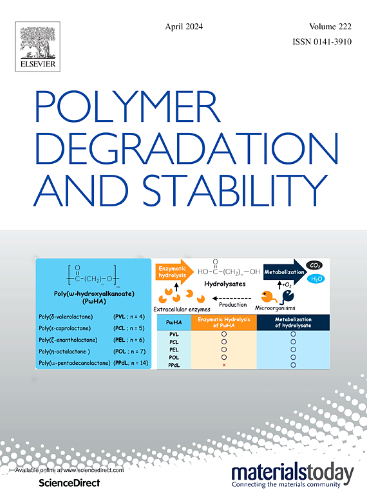不含催化剂的可持续环氧玻璃rimers,含磷化合物提供防火安全性
IF 6.3
2区 化学
Q1 POLYMER SCIENCE
引用次数: 0
摘要
在本研究中,我们设计了一种富磷化合物 DPT,并将其融入到一种典型的可持续环氧树脂玻璃rimer 中,该化合物具有固有的催化特性。通过这一创新策略,可以制造出无需额外催化剂的阻燃环氧树脂玻璃rimer。DPT 是通过三乙醇胺 (TEA) 和氯膦酸二苄酯 (DPCP) 反应合成的。傅立叶变换红外光谱和核磁共振分析证明了 DPT 的成功合成。DPT 有效地加速了环氧树脂玻璃体的固化过程,使材料具有优异的机械强度和固有的自愈合能力。值得注意的是,与使用传统催化剂催化的环氧树脂玻璃rimer 相比,加入 DPT 的环氧树脂玻璃rimer 的 pHRR 降低到 296.3 kW/m2,显著降低了 54%。THR 也从 84.3 MJ/m2 降至 42.4 MJ/m2。利用锥形量热仪和 TG-FTIR 进行的综合分析表明,DPT 能有效抑制有毒气体的排放。最重要的是,环氧基质中 DPT 的存在促进了致密稳定的含磷碳层的形成,这不仅增强了阻燃性,还赋予了卓越的烟雾抑制能力。这些发现强调了 DPT 在开发高性能、无催化剂、阻燃环氧玻璃rimers 方面的潜力。本文章由计算机程序翻译,如有差异,请以英文原文为准。
Catalyst-free sustainable epoxy vitrimers with fire safety offered by phosphorus-containing compounds
In this study, we designed and incorporated a phosphorus-rich compound, DPT, which possesses inherent catalytic properties, into a typically sustainable epoxy vitrimer. This innovative strategy enables the fabrication of flame retarded epoxy vitrimers that require no additional catalysts. DPT was synthesized through a reaction between triethanolamine (TEA) and dibenzyl chlorophosphonate (DPCP). The successful synthesis of DPT is attested to by FTIR and NMR analyses. DPT effectively accelerated the curing process of the epoxy vitrimers, yielding materials with exceptional mechanical strength and inherent self-healing abilities. Notably, the pHRR of epoxy vitrimer incorporated with DPT is reduced to 296.3 kW/m2, showing a remarkable 54% reduction compared to that of the epoxy vitrimer catalyzed by conventional catalysts. The THR is also decreased from 84.3 to 42.4 MJ/m2. Comprehensive analyses using cone calorimetry and TG-FTIR revealed that DPT effectively inhibits the emission of toxic gases. Crucially, the presence of DPT in the epoxy matrix facilitated the formation of a dense and stable phosphorus-laden carbon layer, which not only enhanced flame retardancy but also imparted exceptional smoke suppression capabilities. These findings underscore the potential of DPT for developing high-performance, catalyst-free, flame-retardant epoxy vitrimers.
求助全文
通过发布文献求助,成功后即可免费获取论文全文。
去求助
来源期刊

Polymer Degradation and Stability
化学-高分子科学
CiteScore
10.10
自引率
10.20%
发文量
325
审稿时长
23 days
期刊介绍:
Polymer Degradation and Stability deals with the degradation reactions and their control which are a major preoccupation of practitioners of the many and diverse aspects of modern polymer technology.
Deteriorative reactions occur during processing, when polymers are subjected to heat, oxygen and mechanical stress, and during the useful life of the materials when oxygen and sunlight are the most important degradative agencies. In more specialised applications, degradation may be induced by high energy radiation, ozone, atmospheric pollutants, mechanical stress, biological action, hydrolysis and many other influences. The mechanisms of these reactions and stabilisation processes must be understood if the technology and application of polymers are to continue to advance. The reporting of investigations of this kind is therefore a major function of this journal.
However there are also new developments in polymer technology in which degradation processes find positive applications. For example, photodegradable plastics are now available, the recycling of polymeric products will become increasingly important, degradation and combustion studies are involved in the definition of the fire hazards which are associated with polymeric materials and the microelectronics industry is vitally dependent upon polymer degradation in the manufacture of its circuitry. Polymer properties may also be improved by processes like curing and grafting, the chemistry of which can be closely related to that which causes physical deterioration in other circumstances.
 求助内容:
求助内容: 应助结果提醒方式:
应助结果提醒方式:


